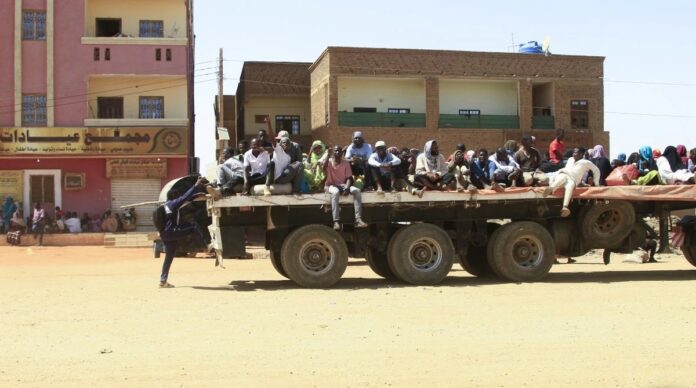| Translate This News In |
|---|
Many citizens of the capital city of Sudan typically go to see family over the Eid al-Fitr holiday, which causes the city to become quiet. Those who can are frantically fleeing Khartoum this year because of the violence.
Despite worldwide calls for a truce to allow for badly needed humanitarian supplies and safe passage for besieged civilians, gunshots and heavy artillery could still be heard in the city on Friday as the three-day Muslim holiday began.
The conflict’s two sides declared a truce on Friday, although intermittent gunfire persisted in Khartoum far into the evening.
Even though the military has closed the bridges that connect Khartoum to its sister cities Omdurman and Bahri across the River Nile, more people have been trying to move to safer parts of the capital over the past week.
They may also have planned a path out, usually to the states of River Nile to the north or Gezira to the south, while beginning their excursions by pushing suitcases through the streets or carrying bags on their heads.
Following the outbreak of violence on April 15, Ahmed Mubarak, 27, claimed to have experienced “extreme anxiety” before deciding to leave Khartoum on Thursday, only carrying the clothing he was wearing.
Since there were no buses, everyone was travelling while carrying their baggage on their backs. Although there were passing autos, they were all private vehicles and all of them were occupied.
He eventually managed to get a ride on a bus whose driver was offering to take passengers outside of the city, and he travelled all the way to Atbara, which is located about 280 kilometres (175 miles) northeast of Khartoum. There, he knocked on the door of his family’s house.
“They were unable to believe it. It was a really lovely moment, he added.
For the first time, the kind of extensive conflict and displacement that Khartoum people had seen take place in other areas of the country in recent years has come to their capital city as a result of the power battle between the Sudanese army and the paramilitary Rapid Support Forces.
The battles, which started during the last few days of the holy month of Ramadan, during which Muslims fast from dawn to nightfall, have caused long-term power and water outages, transformed the airport into a battlefield, and forced the closure of the majority of hospitals.
More than 10 million people live in greater Khartoum, where many neighbourhoods have been cut off from the outside world. People who have ventured outside only to buy goods from looted stores whose stock has been running low have been stuck in their houses.
Dangerous in nature
Another difficulty is finding fuel. Prices have increased since the conflict began, as they have for other products.
Mahasin Ahmed, 55, left the Jabra neighbourhood in southern Khartoum with two relatives in the hopes of finding a bus to Madani, which is located 165 kilometres (100 miles) to the southeast. “Khartoum has become dangerous, and we fear the war will get worse,” she said.
Many people fleeing witness for the first time the devastation caused by the battle, including buildings pierced by rockets, downed power lines, bullet-riddled walls, and the smoking wreckage of burned-out military vehicles left in the streets.
Up to 20,000 people have crossed the border into Chad as a result of the violence that has broken out in other parts of Sudan, and other people have fled northward towards Egypt.
Doctor Makram Waleed, 25, wanted to emigrate to another country with his family but was concerned about the risks to his three younger sisters.
It’s just too difficult to consider the risk of leaving our home and our possessions,” he remarked.
Some people in Khartoum worry that paramilitary fighters may occupy their homes if they leave because the RSF has established itself in various neighbourhoods.
With her two siblings, her uncle and his children, and her 8-month-old nephew, Alia Mutawkel, a 26-year-old architect and interior designer residing in Khartoum, was attempting to locate a safe exit from the city after their plans to celebrate Eid by visiting relatives and friends inside the city were derailed.
Is it possible for us to leave the house or not? Are we going to be safe if we leave the house? And if we depart, will we be able to return to Khartoum and our homes and lives? I keep asking myself all of these questions, but I have no answers.


















